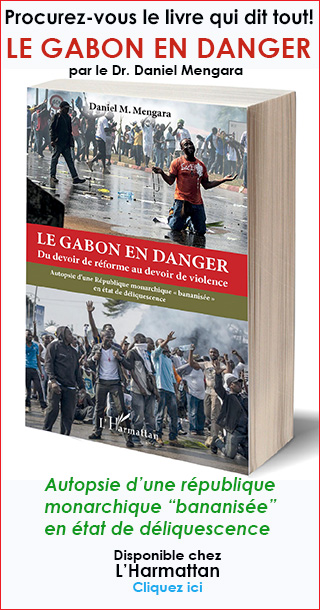By RUKMINI CALLIMACHI, Associated Press Writer Rukmini Callimachi, Associated Press Writer – Sat Jun 20, 10:44 am ET
LIBREVILLE, Gabon – When longtime dictator Omar Bongo died last week, he left behind at least 66 bank accounts. The first family owned 45 homes in France, including at least 14 in Paris and 11 on the French Riviera. And they boasted of 19 or more luxury cars, including a Bugatti sports model that cost the Republic of Gabon $1.5 million.
But most of the country Bongo governed for 41 years is still covered in jungle. A third of its people live in poverty so dire that some dig through the trash dump to feed their children.
The contrast makes it all the more striking that hundreds of thousands of those people lined the streets of the capital this week to bid goodbye to the 73-year-old ruler who bled their country dry. Women wept and waved signs that said, « Merci Papa » — thank you, father. Businesses put up billboards with messages of loss, such as: « Gabon weeps. »
On a continent that has seen more than its share of presidents-turned-dictators, Gabon is perhaps one of the best examples of what analysts call « the chief complex. » So long was Bongo in power that his countrymen came to view him as a hereditary chief, a man whose authority is unquestioned.
The acceptance raises the question of what will happen now in a nation that calls itself a democracy but has in fact never known one. Gabon — where Bongo won election six times in a row — will hold its next elections within 90 days. And already, several of the estimated 30 children he fathered are rumored to be jockeying for power.
« The Gabonese don’t know what democracy looks like. Their point of reference is the village — and in the village, no one questions the chief, » said Anges Ratanga Atoz, a political science professor at Libreville’s Omar Bongo University. « And after all, what did Bongo do that was so bad? Did he kill anyone? No. »
In the village, each family is expected to turn over a share of their harvest to the chief, who uses the grain to feed his people in times of drought. But if the chief also builds himself a brick-and-mortar house while everyone else lives in grass huts, no one says anything. And when he dies, the people mourn.
Masses of Gabon’s 1.5 million people waited outside the airport last week for the convoy carrying Bongo’s body on a special flight back from Spain. Several thousand white and red roses were flown in from France for the funeral, and the coffin was placed inside the presidential palace, surrounded by cascading bouquets.
Thousands of people made pilgrimages to pay their respects. Some even slept on the pavement outside the palace, including 42-year-old Agathe Niengui.
It took Niengui five days to finally make it there with a group of market women. The women had taken a collection among themselves to pull together the funds for a meager offering. They placed a small wreath of plastic flowers — the only kind they could afford — at the foot of the coffin.
By the time they got to the palace, so many wreaths of long-stemmed roses had been placed in and around the coffin that there were dozens of crushed roses underfoot. Each one of the imported flowers costs around $10 — as much as Niengui earns in a week selling bananas from a plate on her head.
It doesn’t strike her as unfair.
« I have a place to sleep. And I have just enough to eat, » she offered as an explanation. « He was the only president I knew — so he was like our father. »
Bongo, the world’s longest ruling head of state when he died, was only 30 in 1966 when he was tapped to become vice president. The deal was reportedly brokered by France, the country’s former colonial ruler intent on maintaining its influence over Gabon. When President Leon M’Ba died of cancer a year later, Bongo took office.
With each passing decade, he consolidated power. He turned his country into a single-party state. Until 1990, he was the only candidate in elections. When opposition parties formed, he allegedly had supporters bussed from town to town to vote multiple times. In 2003, Bongo changed the constitution to get rid of term limits so he could continue running for life.
Bongo’s rise to power coincided with the country’s oil boom. In his first decade in office, oil production jumped 10-fold, even as prices rose because of the 1973 Arab oil embargo. In just one year, Gabon’s national budget tripled.
But as the money poured in, Bongo ignored basic infrastructure in exchange for grand projects. He spent a reported $800 million to build the sea-facing presidential palace and 52 villas to house his guests during a four-day summit of African heads in 1977, according to John Ghazvinian, an expert on Africa’s oil economies. By 1985, Libreville held the world record for per capita champagne consumption.
While much of the country still has no paved roads, Bongo spent 14 years and an estimated $4 billion to build a train. He diverted its route at a cost of hundreds of millions of dollars to reach Franceville, the capital of his native province. Since its opening, the train has required a $60-million-a-year subsidy to stay running.
Ghazvinian compared Gabon’s recent history to a person of modest means winning the lottery.
« What happens when you’re not educated and you don’t have a lot of money and you win the lottery? I think you’ll see that most people don’t end up investing the money. They spend it on prestige and ostentation — as Gabon did, » he said.
In 1999, the U.S. Senate Permanent Subcommittee on Investigations launched a probe into Bongo’s U.S. accounts. The inquiry revealed that at least $130 million had moved through the president’s Citibank accounts, including $49 million in six months.
Bongo asked the bank to convert $1.6 million into cash for a single family trip in 1995 to New York. On another occasion, a third party withdrew $100,000 from Bongo’s account, saying it would be delivered to his son.
When pushed to justify the source of these funds, Citibank told investigators that 8 percent of Gabon’s budget — around $110 million — is set aside each year for discretionary use by the president’s office. Bongo’s personal banker said couriers were sent to bring suitcases of cash back from the oil companies operating in Gabon.
« It annoys me to no end when I see the Gabonese lining up to cry in front of his coffin, » said Gregory Ngbwa Mintsa, one of Bongo’s few critics, who was jailed after signing a lawsuit by anti-corruption watchdog Transparency International attempting to recover Gabon’s stolen riches. « The problem is that everyone aspires to be like him. We are in a system that has lasted 40 years. Even the poorest person now thinks that it’s normal for people in power to steal. »
As the number of heirs to Bongo’s fortune increased, so did palace politics.
Bank documents showed increasingly frenetic activity by his numerous children and grandchildren. In 2006 and 2007, the president’s granddaughter Nesta Ping opened six bank accounts in France. Another relative — believed to be Bongo’s adopted son — spent $5.7 million to buy himself two homes and two apartments in France in 2005, including one in Paris with 13 garage spaces.
Gabonese now worry the president’s family will siphon off the country’s remaining wealth, including money from the safe that takes up one wall of Bongo’s former office.
« The children have emptied out the president’s safe, » whispered one member of the late president’s protocol, who did not give her name for fear of reprisal. « We are worried there won’t be enough money to pay our salaries. »
A diplomat at the Gabonese embassy in Madrid said the scene played out at the president’s deathbed is a sign of what is to come. In May, Bongo — already seriously ill with what is rumored to have been cancer — was flown to Spain and checked into a clinic in Barcelona, where he died June 8.
His children and his closest advisers traveled to Barcelona, but were only allowed as far as the basement waiting room of the Quiron Clinic, said the diplomat, who asked to remain anonymous because of the sensitivity of the matter. The president’s eldest daughter — Pascaline Bongo, who was his chief of staff and is married to the country’s foreign minister — did not allow anyone to see her father, said the official.
« Even his other children couldn’t get in to see him, » he said. « She’s the executor of his will, so draw whatever conclusion you wish. »
The billboards in the capital repeat their messages of adoration even in the places that are the most egregious examples of Bongo’s misrule — like the road leading to the capital’s dump.
An estimated 400 families spend their days digging with bare hands through the valley of trash, skirting piles of medical waste from a nearby hospital including coils of tubing and bags of blood. They are looking for empty bottles to sell — and food to eat.
« If we find a piece of meat, we shake it off, take it home and give it to our wives to cook, » said 41-year-old Crepin Edou, one of the scavengers who was born the year Bongo took office.
When asked about the president’s massive wealth abroad, he shrugged. Overall, Bongo was a good ruler, he said, pointing out that unlike many other African countries, Gabon has never had a civil war.
« We may be poor, » he said, « but at least I have the right to dig through the trash in peace without worrying about a bullet hitting me. »



